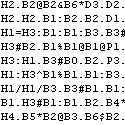 |
 |
 |
REVIEWCampaigns of La Grande Armee 1805/1809By Richard Moore Official
website
This game covers two of the great military expeditions of history and Campaigns of La Grande Armee 1805/1809 will stretch a commander better than most simulations on offer. Its campaigns cover the full Austerlitz and Danube operations in 1805 and 1809, with shorter options for more specific aspects of the manouevres. To start with the French in 1809, courtesy of ordinary leadership from Marshal Berthier, find themselves hanging on for grim death against a major Austrian attack along the Danube. It is all you can do to give as little ground as possible, while reinforcements race to your aid. Troops-wise things even up a bit, but unfortunately for the French commander the time clock is ticking and you need to get a hurry on. For in Campaigns of La Grande Armee 1805/1809 you can play either empire and let the computer test you. If, however, you are France you cannot win as France without capturing Vienna - and that is a long way away from your starting points. They range from from Ulm in the west and Olmutz in the north-east to the Austrian capital in the east. It doesn't matter if you've kicked Austrian butt all the way back there - no Vienna, no win. So after consolidating you need to race for the Danube at an obscene pace and the defensive battles turn into advancing at all costs. This is the second strategic game in the series from Adanac Command Studies - the first Napoleonic offering being LGA 1806 - and is equally as addictive as that title. Now don't expect big graphics or gorgeous sprites. You command boardgame-style counters - you don't even get music or sound effects - and the basic map offers little in the way of visual excitement. But then the developers weren't after awards for a gorgeous-but-boring game. LGA 1805/1809 was designed for challenging playability that would get your military juices flowing. The scale is six miles to the hex and the base units are usually divisions. It is all about supply and striking at the enemy only when you are ready. In the game even commanders like Louis Davout can get horribly mauled if you let down their corps with poor communications, poor supply, or push them too hard. The difficulties of overall command of a Napoleonic army become obvious very quickly and it takes a steep learning curve to get the hang of things. A rulebook would also be very handy as I would love to be able to work out how to activate my replacements. There have been some changes to the original engine and they have added some interesting things to the game. You can now play by email and in a fun move you can also conclude your battles using miniatures, or even other Napoleonic computer wargames. In addition the leaders get bridging rules to allow for building and destroying vital crossings and, in the 1809 game, the French can get supply down the Danube. LGA 1805/1809 runs on Windows 95, 98, ME, 2000, XP with the promise of a Linux version. It is not easy by any stretch of the imagination, but if you are successful you feel you have deserved a victory matching that of Napoleon Bonaparte's real campaign. And it feels very good (even without replacements). 80% |
||
|
Napoleon
Bonaparte
|
|
| Career | Portraits |
| Quotes | Family |
| Loves | Letters |
| Plots | Murdered? |
| His will | Places |
|
Era
of Napoleon
|
|
| Powers | Opponents |
| Coalitions | Allies |
| People | Timelines |
| Key sites | Shrapnel |
|
Warfare
|
|
| Campaigns | Battles |
| Armies | Generals |
| Marshals | Winners |
| Glossary | Medical |
| Weapons | 1812 War |
| Uniforms | Battlefields |
|
War
at Sea
|
|
| Naval War | Heroes |
| Artworks | Signals |
| Nelson | Trafalgar |
|
Maps
|
|
| Key Maps | Peninsula |
| Animated | 1796/1800 |
| 1809 | Russia |
|
French
Revolution
|
|
| Revolution | Guillotine |
| Posters | People |
|
Art,
Film, Games
|
|
| Education | Goya |
| Sharpe | Hornblower |
| Books | Movies |
| DVDs | Music |
| Wargames | Images |
| Cartoons | Caricatures |
|
Other
|
|
| About Us | Sources |
| Awards | Sitemap |
| Links | Militaria |
| Miniatures | Reenactors |
| Forum | Quizzes |
| Home | Waterloo Diorama |
